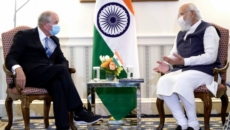Stacity Bailie had been awaiting approval to enter a drug rehabilitation program when she died of an overdose on Oct. 22.
She hadn't been using illicit opioids for long, said her father, Gary Bailie, but the 27-year-old struggled with an alcohol addiction for more than a decade.
“She had such great potential, as do all of these young people who are dying from overdoses."
Stacity was a member of the Kwanlin Dun First Nation in Whitehorse and is part of an increase of Indigenous overdose deaths in Canada during the pandemic.
"I want to put a face to the issue because these deaths are not just statistics,” Gary Bailie said about his decision to tell his daughter's story.
Data from the First Nations Health Authority in British Columbia shows that Indigenous people are five times more likely to experience an overdose and three times more likely to die than other residents. The gap has been further compounded by the COVID-19 pandemic, the authority said.
Dr. Nel Wieman, acting deputy chief medical officer for the authority, said government response to the pandemic played a role in rising overdose rates.
Deaths were declining in 2019, but lockdowns forced people into isolation and more people used drugs alone, she said.
Mental health resources were limited, some treatment centres shut down and borders closed, which cut the illicit drug supply and resulted in higher concentrations of the opioid fentanyl being available, Wieman said.
"The unintended consequences of the public health measures related to the COVID pandemic has exacerbated the toxic drug events and deaths, not to mention the increased toxicity of the drug supply. It's never been more poisonous and deadly," said Wieman.
In Saskatchewan, provincial data shows Indigenous people represent more than half the opioid deaths over the past three years, despite accounting for only 16.3 per cent of the population.
A report released in November by the Chiefs of Ontario and the Ontario Drug Policy Research Network found the illicit overdose death rate for Indigenous people doubled during the first year of the pandemic. There were 116 Indigenous opioid poisoning deaths between March 2020 and March 2021, a 132 per cent increase from the previous year, while the rest of Ontario's population saw a 68 per cent increase.
In Yukon, the coroner's service said its opioid overdose rate per capita is now the highest in Canada, with a reported 48.4 deaths per 100,000 people.
Chief coroner Heather Jones said the fatalities represented more than 20 per cent of all deaths it investigated between January and Nov. 26 of this year. She said it was a "medical crisis," with most people dying alone in their homes and the overdose-reversing drug naloxone becoming less effective against the "increasing toxicity of the drugs."
The Yukon service said it doesn't collect race-specific data, but Kwanlin Dun Chief Doris Bill said people from First Nations are disproportionately affected.
"It's no longer a crisis. It's an emergency," she said. "We need more resources, and we need the federal government to step in to help us."
Wieman said intergenerational trauma plays a large role in the crisis.
"When we talk to communities, that's the linkage. Their generations have unhealed trauma, not just historical trauma like residential schools or the '60s Scoop, but contemporary traumas that are going on in people's lives, especially the last two years," said Wieman, referring to the pandemic, wildfires and floods in B.C.
Gary Bailie draws the same link in Stacity's case. Her mother was abused as a child and killed herself when Stacity was six.
“People (who use drugs) are just trying to escape from their pain. Trauma builds and she was just trying to medicate herself and escape," he said.
Bailie said he plans to devote his life to supporting Stacity's six-year-old daughter.
"It’s my last chance to break the cycle."
The effect on smaller communities is magnified because everyone knows each other and access to a safe supply of medication is more difficult, Weiman said.
"Racism is also widespread in B.C.'s health system and that probably contributes to the toxic drug crisis because people do not come forward to seek help, not because the service isn't there, but because they fear how they're going to be treated."
Last year, retired judge Mary Ellen Turpel-Lafond released a report that found "widespread stereotyping, racism and profiling of Indigenous people" in B.C.
In a recent interview, Turpel-Lafond said more research needs to be done on the compounding effects of the overdose crisis and COVID-19, with the awareness of the overarching issue of racism in health care.
"What I'd like to see is more analysis into whether there's effective treatment services, whether they're culturally safe, low barrier, accessible and where they're needed," she said.
British Columbia declared the overdose crisis a public health emergency nearly six years ago. Wieman said still calling it an emergency after more than half a decade has lost its meaning.
"There's a bit of neglect of the urgency of this problem because of stigma and stereotypes, and that's the big difference between COVID and the toxic drug crisis. The messaging the whole time through COVID has been 'we're all in this together' and the subtle message during the toxic drug crisis is 'I'm glad it's you and not me,'" she said.
The B.C. government has asked Ottawa to allow the province to be the first in the country to decriminalize the possession of small amounts of illicit drugs.
“By decriminalizing, we are removing a barrier to treatment and services. I hear shame and fear make people hide their drug use and leads them to use drugs alone,” said Sheila Malcolmson, B.C.'s minister of mental health and addictions, said in November.
National Chief RoseAnne Archibald of the Assembly of First Nations said the COVID-19 pandemic has been "spiritually harmful" because it has prevented traditional and communal grieving processes, which added to the "collective trauma" of Indigenous people.
“Connection is healing and it's so hard right now, which is why you see an increase in addiction and mental health issues," Archibald said. "Federal and provincial governments need to invest in healing services and programs that are going to build resiliency."
In Ontario, Regional Chief Glen Hare said the reports were "very explicit in providing evidence that governments need to correct the underfunding that has been occurring for years to make effective progress on addressing the overdose crisis in First Nations communities.''
In Yukon, Kwanlin Dun's chief wants that territory's government to review its opioid strategy to identify and fill gaps in service, including adding Indigenous-specific cultural supports at a safe consumption site that recently opened in Whitehorse.
"It's already difficult enough for vulnerable Indigenous people to make use of services and programs that are out there, and a lot of it stems back to residential schools, among other things, so it's really important that we have the proper cultural supports in place for our people," Bill said.
Gary Bailie said there is a need for widespread societal change to understanding addiction in Canada.
"Nationally, we have a pretty big problem on our hands. It needs to be treated with more seriousness and there needs to be more action."






